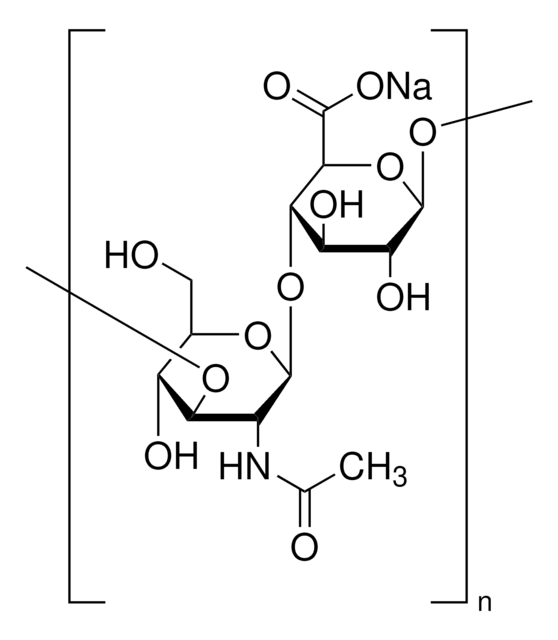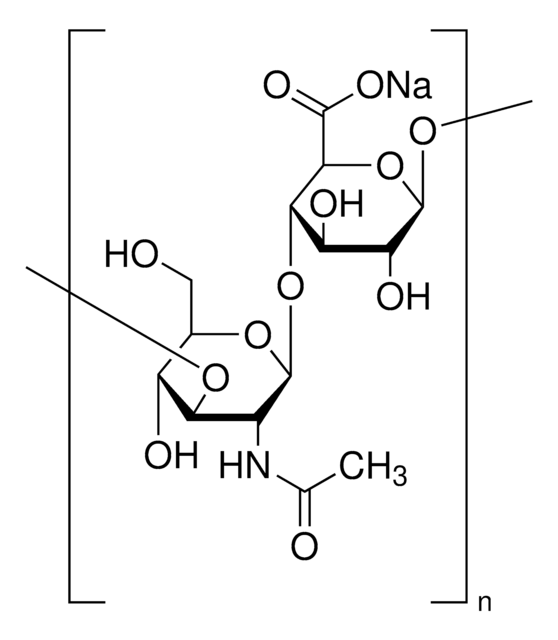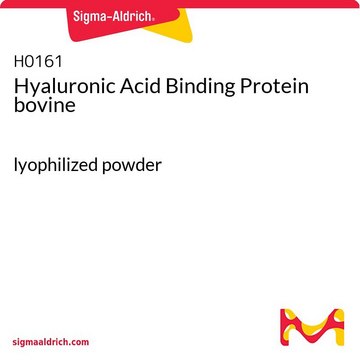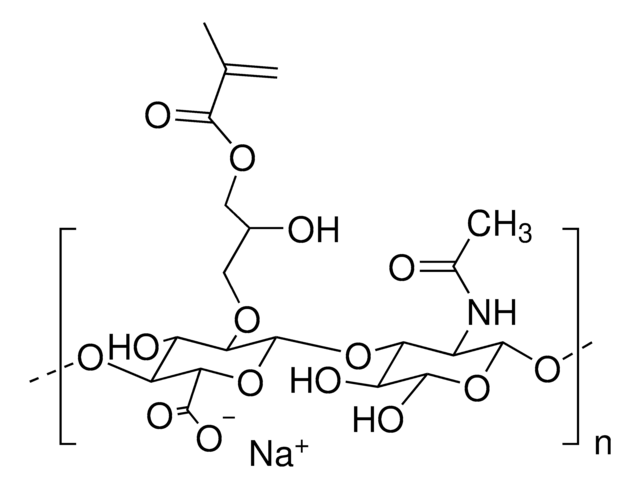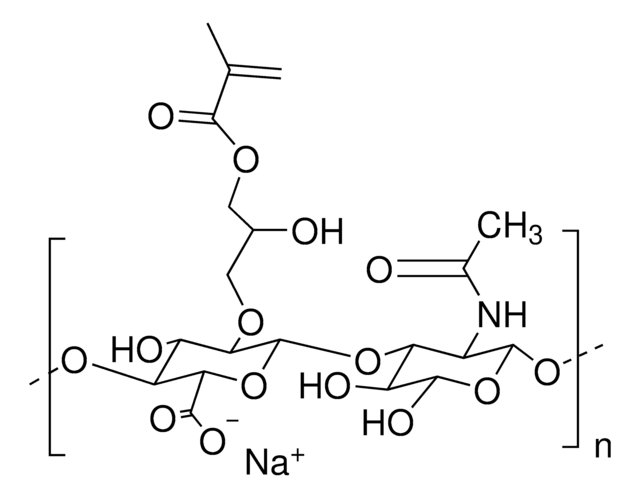924474
Hyaluronic Acid
Low Viscosity, Low endotoxin
Synonym(e):
3D bioprinting, HA, Hyaluronan
Anmeldenzur Ansicht organisationsspezifischer und vertraglich vereinbarter Preise
Alle Fotos(1)
About This Item
UNSPSC-Code:
12352201
NACRES:
NA.23
Empfohlene Produkte
Qualitätsniveau
Form
(powder or chunk(s) or fibers)
Verunreinigungen
<10 CFU/g Bioburden
<100 EU/g Endotoxin
Farbe
white to off-white
Eignung
conforms to structure for NMR
Lagertemp.
2-8°C
Allgemeine Beschreibung
Hyaluronic acid (HA) is a linear polysaccharide of alternating D-glucuronic acid, and N-acetyl-D-glucosamine found in the extracellular matrix. HA is commonly chemically modified to form covalently crosslinked hydrogels. Other properties of HA include cell surface receptors CD44 and RHAMM recognition and degradation via hyaluronidases.
Anwendung
HA is increasingly used for the following biomedical applications:
Our low endotoxin HA is tested for both endotoxin (< 100 EU/g) and bioburden (< 10 CFU/g) levels, so you can choose which material is right for your research.
- Cell migration
- Angiogenesis
- Viability
- Proliferation
Our low endotoxin HA is tested for both endotoxin (< 100 EU/g) and bioburden (< 10 CFU/g) levels, so you can choose which material is right for your research.
Lagerklassenschlüssel
11 - Combustible Solids
WGK
WGK 3
Flammpunkt (°F)
Not applicable
Flammpunkt (°C)
Not applicable
Hier finden Sie alle aktuellen Versionen:
Analysenzertifikate (COA)
Lot/Batch Number
Leider sind derzeit keine COAs für dieses Produkt online verfügbar.
Wenn Sie Hilfe benötigen, wenden Sie sich bitte an Kundensupport
Besitzen Sie dieses Produkt bereits?
In der Dokumentenbibliothek finden Sie die Dokumentation zu den Produkten, die Sie kürzlich erworben haben.
Tracey J Brown
Current pharmaceutical biotechnology, 9(4), 253-260 (2008-08-12)
Despite advances in chemotherapeutic regimens, the treatment of metastatic cancer remains a challenge. A key problem with chemotherapy drugs is nonspecific drug distribution, resulting in low tumor concentrations and systemic toxicity. The holy grail of clinical cancer research has been
Federica Camin et al.
Journal of agricultural and food chemistry, 58(1), 570-577 (2009-12-17)
H, C, and O stable isotope ratios and the elemental profile of 267 olive oils and 314 surface waters collected from 8 European sites are presented and discussed. The aim of the study was to investigate if olive oils produced
Xian Xu et al.
Soft matter, 8(12), 3280-3294 (2012-03-16)
Hyaluronic acid (HA) is one of nature's most versatile and fascinating macromolecules. Being an essential component of the natural extracellular matrix (ECM), HA plays an important role in a variety of biological processes. Inherently biocompatible, biodegradable and non-immunogenic, HA is
Kevin T Dicker et al.
Acta biomaterialia, 10(4), 1558-1570 (2013-12-24)
Hyaluronan (HA) is a linear polysaccharide with disaccharide repeats of d-glucuronic acid and N-acetyl-d-glucosamine. It is evolutionarily conserved and abundantly expressed in the extracellular matrix (ECM), on the cell surface and even inside cells. Being a simple polysaccharide, HA exhibits
Unser Team von Wissenschaftlern verfügt über Erfahrung in allen Forschungsbereichen einschließlich Life Science, Materialwissenschaften, chemischer Synthese, Chromatographie, Analytik und vielen mehr..
Setzen Sie sich mit dem technischen Dienst in Verbindung.
